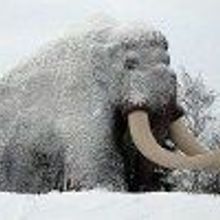Login
Subscribeancient DNA

Oldest Hominin DNA Ever Sequenced
Ed Yong | Dec 4, 2013 | 4 min read
A 400,000-year-old mitochondrial genome adds new twists to scientists’ picture of early human evolution.

Bacteria Can Integrate Degraded DNA
Kerry Grens | Nov 18, 2013 | 4 min read
In lab experiments, bacteria usurp small, damaged fragments of DNA, including those from a 43,000-year-old woolly mammoth.

Origin of Domestic Dogs
Ed Yong | Nov 14, 2013 | 3 min read
New analysis suggests that domestic dogs evolved from European wolves that interacted with human hunter-gatherers.

European Roots for Native Americans?
Bob Grant | Oct 29, 2013 | 2 min read
An analysis of ancient DNA from a 24,000-year-old Siberian skeleton generates a new model for the original peopling of the Western Hemisphere.

The Mummy Code
Dan Cossins | Aug 1, 2013 | 4 min read
Ancient-DNA researchers have long clashed over work on Egyptian mummies, but next-gen sequencing might resolve their debates.

Sequencing Mummies
Dan Cossins | Jul 31, 2013 | 1 min read
Peek inside the South Tyrol Museum of Archaeology in Italy, where researchers are unravelling the DNA of centuries-old mummies.

Horse Genome Is Oldest Ever Sequenced
Dan Cossins | Jun 26, 2013 | 3 min read
By sequencing the genome of a 700,000-year-old horse, researchers have pushed back the time of DNA survival by almost an order of magnitude.

Mammoth Blood Gives Hope for Cloning?
Bob Grant | Jun 3, 2013 | 2 min read
Some question the supposition that viable cells and DNA will be found in a remarkably preserved carcass, purported to harbor fresh muscle tissue and flowing blood.

Oral History
Dan Cossins | Jun 1, 2013 | 4 min read
Researchers use DNA from ancient tooth tartar to chart changes in the bacterial communities that have lived in human mouths for 8,000 years.

The Spoils of War
Kerry Grens | Feb 1, 2013 | 4 min read
Researchers read the marks of intense warfare and conquest in the genes of ancient native North Americans.
New Hominin Found via mtDNA
Alla Katsnelson | Mar 23, 2010 | 3 min read
A previously unknown human ancestor may have coexisted with Neanderthals and early modern humans.
Oxford DNA Lab Leaderless
Stephen Pincock(Stephen@thescientisteurope.com) | Jun 1, 2005 | 2 min read
University ponders how to replace director of its ancient DNA lab, who quit under a cloud.